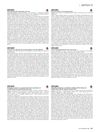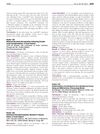 159 citations,
December 2007 in “American Journal of Pathology”
159 citations,
December 2007 in “American Journal of Pathology” Stress-related substance P may lead to hair loss and negatively affect hair growth.
 76 citations,
March 2005 in “Journal of Molecular Medicine”
76 citations,
March 2005 in “Journal of Molecular Medicine” Certain mice without specific receptors or mast cells don't lose hair from stress.
 66 citations,
July 2007 in “Journal of Molecular Medicine”
66 citations,
July 2007 in “Journal of Molecular Medicine” Stress increases certain chemicals in the skin and nerves, which might worsen skin conditions.
 48 citations,
May 2015 in “NPJ microgravity”
48 citations,
May 2015 in “NPJ microgravity” A 3-month stay in space causes skin thinning, disrupts hair growth, and changes muscle-related genes in mice.
 31 citations,
April 2007 in “Experimental Dermatology”
31 citations,
April 2007 in “Experimental Dermatology” Stress in mice delays hair growth and treatments blocking substance P can partly reverse this effect.
 22 citations,
November 2014 in “Psychiatric Clinics of North America”
22 citations,
November 2014 in “Psychiatric Clinics of North America” Stress can worsen skin conditions and affect mental health, so doctors should include stress management in skin treatment.
 21 citations,
January 1988 in “Stress Medicine”
21 citations,
January 1988 in “Stress Medicine” Stress affects skin health and emotional well-being should be considered in skin disease treatment.
 2 citations,
May 2021 in “Scientific Reports”
2 citations,
May 2021 in “Scientific Reports” Stress is likely causing hair loss in Formosan macaques.
 November 2017 in “Dermatologic Therapy”
November 2017 in “Dermatologic Therapy” A new topical solution safely reduces hair shedding by 38% on average by tightening a muscle in the scalp.
 49 citations,
July 2004 in “Anesthesiology”
49 citations,
July 2004 in “Anesthesiology” The document concludes that more research is needed to understand how to treat muscle pain with drugs.
 5 citations,
January 2016 in “Stem Cells International”
5 citations,
January 2016 in “Stem Cells International” Certain skin cells near the base of hair muscles may help renew and stabilize skin, possibly affecting skin disorder understanding.
 1 citations,
August 2018 in “Journal of Investigative Dermatology”
1 citations,
August 2018 in “Journal of Investigative Dermatology” Muse cells keep their special features and can become different cell types even after being frozen and thawed three times.
 November 2024 in “Benha Journal of Applied Sciences”
November 2024 in “Benha Journal of Applied Sciences” Reduced alpha smooth muscle actin may cause hair loss in androgenetic alopecia.
 3 citations,
September 2022 in “Frontiers in psychiatry”
3 citations,
September 2022 in “Frontiers in psychiatry” University students in Egypt experienced high stress during COVID-19's third wave, with negative coping mechanisms being more common.

The EMG-to-force model accurately predicts hip muscle forces during walking.
 119 citations,
January 2012 in “Nutrition & Metabolism”
119 citations,
January 2012 in “Nutrition & Metabolism” Modern lifestyles, including poor diet, stress, and long-term use of certain medications, hinder the body's ability to heal from inflammation, leading to chronic diseases.
 January 2024 in “Biological & clinical sciences research journal”
January 2024 in “Biological & clinical sciences research journal” Apigenin, found in plants and vegetables, has many health benefits, including anti-inflammatory, antioxidant, and anticancer effects.
 16 citations,
November 2021 in “Antioxidants”
16 citations,
November 2021 in “Antioxidants” Managing oxidative stress might help treat low testosterone and related chronic diseases in aging men.
 1 citations,
September 2023 in “Applied sciences (Basel)”
1 citations,
September 2023 in “Applied sciences (Basel)” Ishige sinicola extract may help prevent muscle atrophy through its antioxidant and anti-inflammatory effects.

A woman had temporary hair loss due to stress from a spinal cord injury.
88 citations,
August 2014 in “PLOS genetics” Syndecan-1 is essential for maintaining skin fat and preventing cold stress.
6 citations,
November 2022 in “Antioxidants” OR2AT4 helps reduce aging and cell damage in human skin cells.
 April 2024 in “Clinical, cosmetic and investigational dermatology”
April 2024 in “Clinical, cosmetic and investigational dermatology” Salvianolic Acid B helps hair grow by reducing cell stress and increasing blood flow to hair follicles.
 November 2023 in “Frontiers in cell and developmental biology”
November 2023 in “Frontiers in cell and developmental biology” Hair aging is caused by stress, hormones, inflammation, and DNA damage affecting hair growth and color.
 September 2014 in “Springer eBooks”
September 2014 in “Springer eBooks” Aging causes hair to gray and thin, with the timing of graying varying by race, and factors like oxidative stress and genetics can lead to hair loss.
 379 citations,
May 2016 in “Cochrane library”
379 citations,
May 2016 in “Cochrane library” Corticosteroids, especially prednisone, improve short-term muscle strength in Duchenne muscular dystrophy but have manageable side effects.
 65 citations,
September 2010 in “Journal of the Neurological Sciences”
65 citations,
September 2010 in “Journal of the Neurological Sciences” Kennedy's disease leads to muscle weakness and sensory issues, has no cure but manageable symptoms, and future treatments look promising.
62 citations,
July 2013 in “American Journal of Clinical Dermatology” Alopecia areata patients have higher oxidative stress and lower antioxidant levels.
 34 citations,
October 2011 in “Pathology Research International”
34 citations,
October 2011 in “Pathology Research International” Behçet's Disease may be caused by genetic and environmental factors leading to abnormal immune responses, and stress management and new treatments could improve patient outcomes.
 25 citations,
September 2014 in “Biological Research”
25 citations,
September 2014 in “Biological Research” Arctiin helps protect hair cells from damage and death caused by oxidative stress.



























